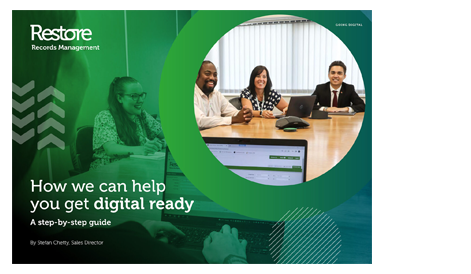
Is it time to outsource? A step-by-step guide
Every NHS Trust wants to save time and money – and doing so is an ambition that has proved even more elusive than a paperless future.
However, there’s one forgotten area where potential savings may be sneaking under the radar: patient records storage.
Outsourcing can deliver savings and help NHS Trusts to ‘improve service and optimise patient records.
But many Trusts have not yet taken up the option.
Stefan Chetty,
Director of Public Sector Services, Restore Records Management
Why? Well, we’ve noticed that many NHS Trusts are underestimating the true cost of storing physical patient records – which means they start with a belief that outsourcing will be more expensive.
This also means they underestimate the savings that can be made – and, as a result, never get to discover the other benefits available.
Yes, they’ve factored in the basics, like the cost of on-site Health Records Libraries or off-site leasing, but other hidden costs and the value of the storage space itself are often overlooked.
In this blog, we’ll share a step-by-step guide that’ll help you uncover those hidden expenses and keep your budget in check.
1. Factor in all your sites
Don’t forget about the not-so-obvious sites.
Integrated care systems may have helped with collaboration, but the reality is they have grown up separately. Records storage solutions are often disjointed – and expenses look very different from one hospital to the next.
Keep a close eye on satellite sites. Moorfields, for instance, has a famous site on City Road in London but also three other sites based on other hospitals’ premises and staffed by Moorfields employees.
2. Include transport and porterage
Are your patient records stored off-site? Remember to account for the cost of transporting them back and forth.
While it may seem cost-effective to have staff retrieve records, hidden expenses like transportation costs and time consumption often accumulate.
Ordering taxis to transport urgent notes is not uncommon. This is not only costly and impractical, but raises concerns about safety and GDPR compliance, too.
3. Understand the value of property
Weigh up the worth of buildings.
Even if the building is on-site and owned, there are maintenance and utility expenses that should be attributed. Leasing from private companies also adds significant costs to the equation.
In addition, if that building, is taking up space which could be used for something else then that’s a relevant consideration.
If you need extra space for medical services how much would it cost to buy or lease something the same size? If you have a building worth millions of pounds in the centre of London, is storing records there justified?
4. Consider the cost of wages and recruitment
It’s common knowledge that NHS Trusts deal with a lot of staff churn – and often turn to expensive bank staff to fill the gaps.
Whether in the Health Records Library or on the ward, hiring external personnel can result in substantial premiums.
Outsourcing patient records can free up employee time, reduce staffing costs, and pave the way for significant savings in the long run.
5. Don’t forget stationery
Stationery costs can creep up on you. From folders to labels and spines to stickers. All have to be sourced and replaced from time to time.
Many Trusts take the casual route – a missed opportunity to save. While, due to the scale of their economy, Records management companies can source these items more cheaply, streamlining stationary across all files at the same time.
It’s a one-way ticket to savings and making future digitisation a breeze.
Intrigued? Take a closer look at your records management costs and uncover the benefits of outsourcing. We’re here any time to talk it through…
For more information about how we support the NHS
Click hereFurther insights



